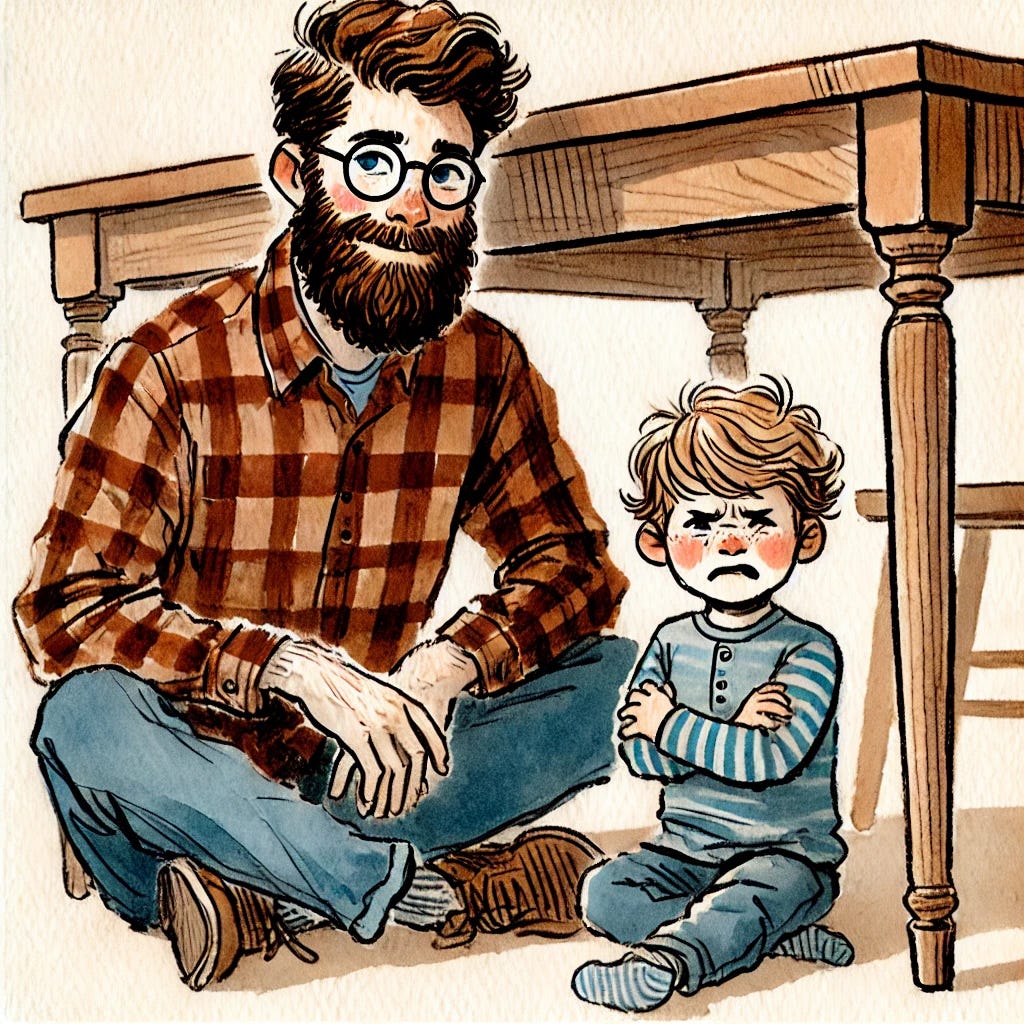The Case for Mindful Parenting (And Why We Need It Now)
Kids absorb our stress more than we realize. Here’s how mindfulness can help.
"No! I don't want that! I want to play!"
My son screamed, slammed his utensils, and slid from his chair, collapsing into a sobbing heap under the table.
I had just broken the news that we wouldn't have time to play before bedtime because dinner had taken too long. As usual, this didn’t go over well. He had played for an hour before dinner, but he wanted more.
It was 7:30 p.m. on a Tuesday. I was tired, my wife was tired, and most importantly, my son was tired. Exhausted, actually. On top of a full day at school, he’d had swimming lessons that afternoon and a "wee-ball" practice the night before that pushed our schedule past his bedtime.
I took a beat, reminded myself of his exhaustion, and slid under the table to be with him.
"Tell me what you're feeling, buddy."
"I feel sad."
"I understand. You want a hug?"
Through tears and sobs, he let out an exaggerated, "Yeeeahhh."
I asked if he’s also feeling anger. Frustration. Disappointment. Three more "yeahs." I told him those feelings are okay. We stay locked in a hug for several minutes. After he calmed down, I challenged him to a race to the bathroom to brush his teeth. It’s always a game of "runt roulette," finding the right moment and method to coax him into his bedtime routine. To my relief, he accepted—and, unsurprisingly, wiped the floor with me in the race.
I can’t take credit for this approach. All credit goes to my wife, who studied gentle and authoritative parenting methods extensively before our son was born. Accepting tantrums, validating feelings, even modeling self-regulation in the midst of it all—these were new concepts to me. I had practiced mindfulness semi-seriously for years, but it had never occurred to me to use the same techniques with my young kids. I thought mindfulness might be too esoteric for a toddler. But so far, it’s worked almost every time.
Mindfulness is more recognized in our culture now than it was when I was a kid, but it’s still a “woo-woo” concept to some. The truth is, though, we—and our kids—need it more than ever. In a post-pandemic, politically charged, economically uncertain world with 24-hour in-your-face bad news, stress in the home is peaking. And even if kids don’t know the source, they feel it.
In her book Mindful Parenting, child psychologist Kristen Race, PhD, writes that most parents underestimate how much their stress affects their children. Yet 91% of children report noticing their parents' stress through behaviors like yelling, arguing, and complaining. And that awareness causes the stress to rub off. Race explains that parental stress is highly contagious due to mirror neurons, which reflect emotions. Even if we don’t verbally acknowledge our stress, kids absorb it.
But those same mirror neurons can pass on positive emotions, too. Mindfulness helps keep stress at bay and protects kids from unnecessary emotional strain.
That’s great news because children who experience high levels of stress tend to fall into sedentary habits like excessive TV and video games, which increase stress. Chronic stress from over-scheduling and a lack of cognitive defenses make it harder for kids to manage adversity and build resilience.
According to Race, studies show that while kids today face fewer physical dangers than previous generations, our relentless focus on safety may come at the cost of their emotional growth. Helicopter parenting prevents kids from dealing with discomfort and failure. An overemphasis on academics and extracurriculars has led to the loss of recess and free time. As a result, kids are growing up without intellectual curiosity, creative problem-solving skills, or persistence in the face of challenges.
So what do we do? It might seem simple, but the easiest way to counteract all this overwhelm is to pay attention. Cultivating mindfulness at home strengthens the whole family’s mental resilience. Like taking our brains to the gym, mindfulness builds emotional reflection and coping skills.
Friday, we’ll explore practical ways to introduce mindfulness and other resilience-building methods into our families. But until then, keep this in mind: parents set the tone. Kids—especially young kids—learn to mimic how we deal with the world. If we model healthy, practical strategies for managing stress, they’ll learn them, too. And someday, when they’re navigating their own world of responsibilities and pressures, they might thank us—not for being perfect, but for showing them a way through it.
Affiliate Disclaimer:
Paternal Progress participates in the Bookshop.org affiliate program. This means that when you purchase books through the links on this page, I may receive a small commission of 10 percent from each sale. This helps support the work I do at Paternal Progress, without any extra cost to you. I only recommend books I genuinely believe will benefit you and your family. Thank you for supporting my site and local bookstores!



